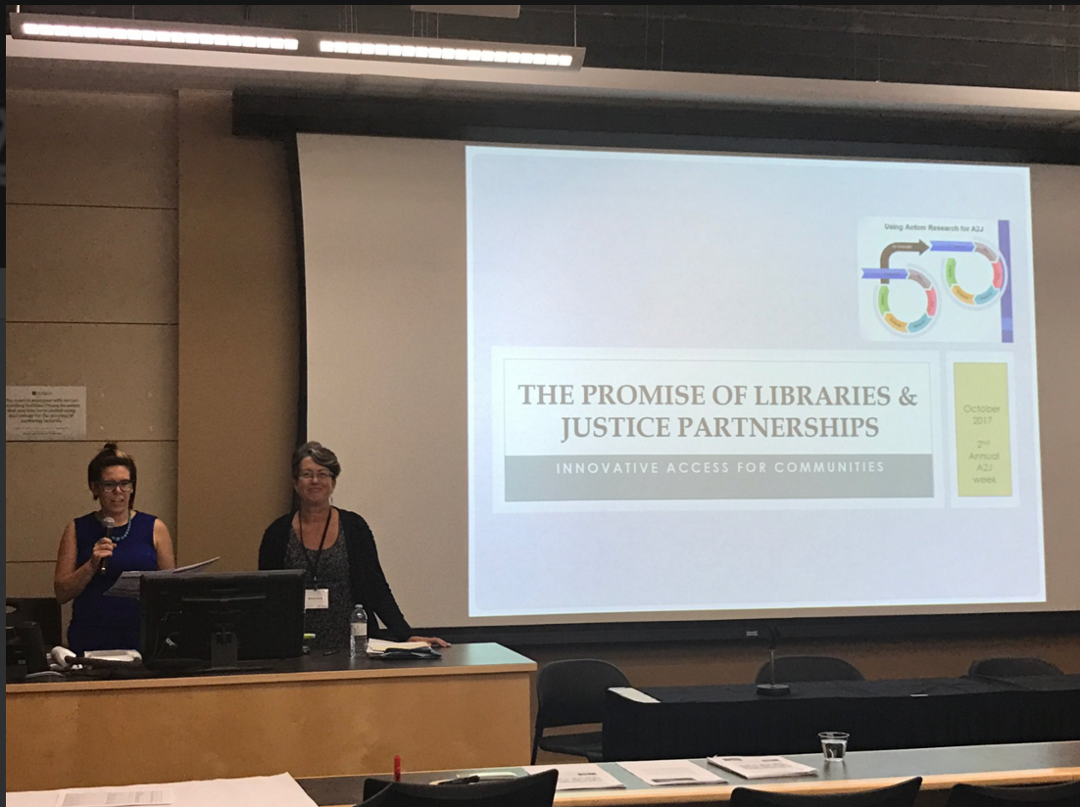
Public, justice, healthcare and library sectors come together for access to justice solutions
On Oct. 16, the Saskatchewan Ministry of Justice officially proclaimed Saskatchewan’s Second Annual Access to Justice Week.
A pop-up presentation on improving access to justice for people with disabilities kicked off the week of events, which brought together law students, those in legal and other diverse professions, and members of the public, to continue discussions on improving access to justice in the province.
The week’s activities engaged a wide range of organizations, including the Law Society of Saskatchewan, Pro Bono Students Canada , Saskatchewan Public Libraries, and CLASSIC (Community Legal Assistance Services for Saskatoon Inner City), and the variety of events sent a clear message: access to justice is an interdisciplinary topic.
“Access to justice is a hugely diverse issue, and different communities face different barriers,” said Brea Lowenberger, director of CREATE Justice at the College of Law, and Saskatchewan’s access to justice coordinator. “It is complex to solve, and for this reason, we must engage a wide range of stakeholders, including the public, and work together to move the conversation toward solutions.”
Access to Justice Week highlighted the importance of collaboration, and the blossoming relationship between healthcare and justice was one such example. Partnerships between health and justice organizations are being hailed as a potential solution to alleviate negative health issues caused by legal concerns, and vice versa. A lecture by Michele Leering, Executive Director of the Community Advocacy and Legal Centre in Belleville, Ont., reflected on the topic.
Leering spoke of justice-health partnerships as a proactive approach in communities to relieve the health disparities caused by legal problems. While these partnerships are common in the United States and Australia, they are just beginning to appear in Canada, but they have huge potential to impact access to justice in Saskatchewan.
The lecture is a continuation of discussions on expanding engagement between justice and health services in Saskatchewan, initiated at the College of Law’s Dean’s Forum on Access to Justice and Dispute Resolution in March, which engaged the U of S College of Medicine.
“More research is needed into the potential benefits of health-justice partnerships, however, we have already engaged provincial health partners in the discussion, so it is an exciting example of the importance and promise of collaboration in solving access to justice issues,” explained Lowenberger.
The week also marked the first birthday of the College of Law’s CREATE Justice research centre, established in response to calls for increased research and understanding of the barriers people face in accessing Saskatchewan’s justice system. CREATE addresses known gaps in research data and develops a clear view of access to justice challenges, and has played a key role in bringing justice partners together to work on solutions.
In response to the recent events, Lowenberger is delighted with the level of engagement. “I am particularly pleased with the interest shown in events aimed at the public,” she said. “It is extremely encouraging and I have no doubt that we will build on the input we have received so far, to continue working towards access to justice solutions.”
